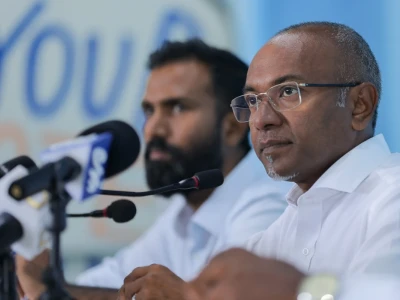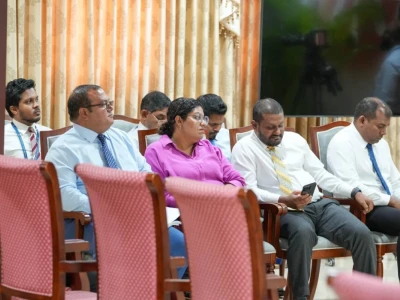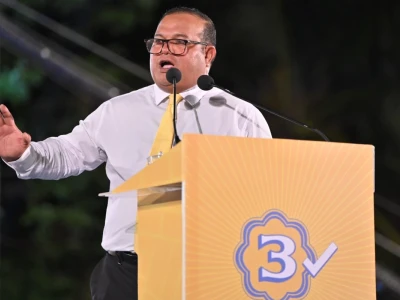
Nasheed's confidence motion can proceed in Eva's absence, Supreme Court rules
The court in a majority ruling rejected MDP's request to declare that no other work can be done without taking a decision on Nasheed's motion.
By
Fathmath Ahmed Shareef
Supreme Court on Thursday ruled that the no-confidence motion against the speaker of parliament can proceed in the absence of the deputy speaker.
MDP filed a constitutional petition at the Supreme Court late last month seeking an order that the parliament's counsel general and secretary general's decision to interpret the rules of procedure that no other MP apart from the deputy speaker could chair a vote on the no-confidence motion against the speaker was unlawful.
The five-member Supreme Court bench that adjudicated the case unanimously ruled that the no-confidence motion against the speaker could be presided over by an ordinary member of parliament in the absence of the deputy speaker.
However, the Supreme Court in a majority ruling rejected MDP's request to declare that no other work can be done without taking a decision on Nasheed's no-confidence motion resolution.
Presiding Justice Mahaz Ali Zahir said that the statements made by all the parties involved in the case except The Democrats showed that the proceedings of the parliament has been disrupted. He considered this to be a matter within the jurisdiction of the Supreme Court.
Therefore, the Democrats' objections that the Supreme Court does not have jurisdiction to hear the case cannot be accepted, Mahaz said.
In addition, the judge noted that the rules do not provide for the next step in the absence of the deputy speaker.
Mahaz's opinion is as follows:
-
The decision of the parliamentary administration not to proceed with the no-confidence motion against the speaker in the absence of the deputy speaker is unconstitutional
-
In the absence of the deputy speaker, the matter shall be conducted with the ordinary members presiding over the sitting
-
The no-confidence motion must be moved in the first sitting after the required 14 days notice on the removal of the speaker and no other motion may be taken up without deciding on the confidence motion
The other four judges seconded the part of Mahaz's opinion, which stated that the no-confidence motion should be conducted in the absence of the deputy speaker with an MP presiding over the sitting.
However, Justice Husnu Al Suood issued a dissenting opinion on the part of Mahaz's opinion that the parliament cannot conduct any other work without taking a vote on the no-confidence motion against the speaker.
The other three remaining judges of the bench, Dr Azmiralda Zahir, Ali Rasheed and Mohammed Ibrahim supported seconded Suood's dissenting opinion on the matter.
Suood said the rules specifically state that if the court orders a specific action, it may be an infringement of parliamentary privileges. If it interferes in parliamentary affairs in that way, the verdicts could become politicised and confidence in the courts could be lost, he said.
Suood said:
-
According to the parliament secretariat, the situation or the incapacity referred to in Article 205(d) of the rules of procedure of the parliament arises when the motion to remove the speaker is moved in a sitting of the parliament; the provision has been correctly interpreted by the secretariat
-
Even if the no-confidence motion does not proceed, there is no obstacle to other work in parliament
-
There is no obstacle to the approval of the state budget, the swearing-in of the new president and the endorsement of ministers; the parliamentary office cannot do that
In the petition to the Supreme Court, the MDP asked:
-
To declare unconstitutional the decision of the parliament secretariat that only the deputy speaker of parliament can preside over the no-confidence motion against the speaker
-
To declare that in the absence of the deputy speaker, the sitting where the no-confidence motion against the speaker is tabled shall be presided over by one of the MPs designated to preside in accordance with Article 44 of the rules of procedure
-
To declare that no further work can be done in parliament without a vote on the no-confidence motion against the speaker
Nasheed's impeachment was first moved by government MPs in June. However, after the opposition PPM-PNC won the first round of the September presidential election, the motion was withdrawn following a “deal” between the two parties seeking Nasheed's assistance in the second round, which soured.
-
After the MDP's defeat in the second round of the presidential election, Nasheed's impeachment process resumed
-
On October 9, the motion was submitted to the parliament for the second time with the signatures of 49 MDP MPs
-
On October 12, the parliament accepted the motion and sent a 14-day notice
-
However, no sitting has been held on the issue so far
Related
Related

MPs blackmailed to resign Nasheed's confidence motion: Ilyas

Democrats allowed to intervene in SC petition on Nasheed ouster

MDP asks to amend agenda to include Nasheed's motion

